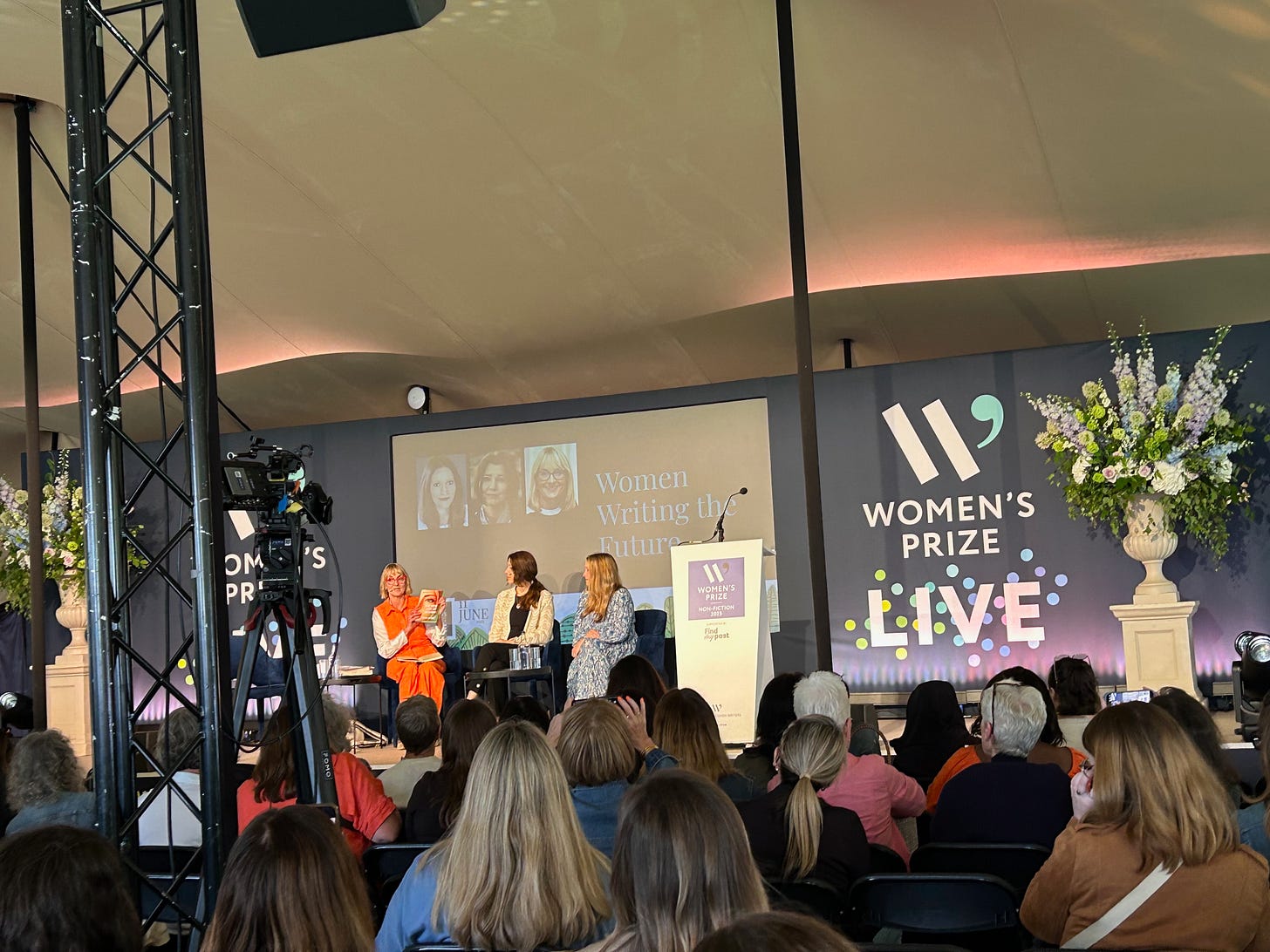A couple of weeks ago, I went to the Women’s Prize Live in Bedford Square Gardens.
I joke with the hubby that this is my equivalent to an afternoon of live sport for him. I am like a pig in the proverbial, listening to writers talk about writing, writing about writing, and talking about writing with other writers. And there was a goody bag with, yes, you’ve guessed it, books. My cup was full.
But it’s not just about the books. I am endlessly interested, delighted and in awe of what other people have to say with their creative work. I love listening to stories.
I reflected on this during the train journey home, notebook and pen in hand. What is it about other people’s stories that I find so compelling?
The more I hear and read people’s stories, the more convinced I become. Stories are not just nice to have. They are not only an enjoyable way to pass the time or an hour of escapism (both are valuable and reasons I read).
Sometimes it goes deeper.
One speaker at the Women’s Prize Live, Elif Shafak, talked about stories and other forms of art as a means of restoring individuality and humanity. Stories are vital to our existence as humans.
Shafak believes that our stories stand against the dangers of uniformity. Stories encourage us to step away from conforming and celebrate uniqueness. I agree - our stories are all unique, however ordinary we think they are. In fact, it’s often in the uniqueness and ordinariness of our stories that we best connect with others.
I’ve noticed that using my voice and sharing my stories as honestly as I can is vital for my mental, physical and emotional well-being. When I feel cannot speak my mind or I am not listened to, I shrink into myself and feel hurt, resentful, and devalued. When I can express myself fully, either on the page or through what I say, I feel alive. Self-expression matters a great deal.
Any form of art, including storytelling, is a powerful form of self-expression, and self-expression brings us back to ourselves.
I am learning more and more that coming back to myself is the kindest and best way I can live, for myself and for those around me.
Consider how you feel when you’re able to express yourself honestly and fully, in whatever context that may be. What impact does this have on you and others?
As Shafak said, ‘the faster the world spins, the more we need to slow down and engage with stories.’ Yes, to that.
Stories can be powerful in many other ways as well. During the Women’s Writing Prize Live event, I heard women from different backgrounds with unique experiences explain where their stories came from and why they chose to tell them. Their whys were all unique and all inspiring.
Here are a few I thought I’d share with you:
Laura Bates shares women’s stories about sexism to hold those in power to account and change the narrative for future generations of girls and women. Stories are the power of the collective voice.
Jenny Knight and Charlotte Paradise write their stories to help women to feel seen and validated in different ways and to give them a sense of hope. When we share our stories, we are giving others a gift.
Elif Shafak writes to bring more knowledge and wisdom to a world saturated with information to foster curiosity and innovation. She believes our stories help us connect with other humans across cultures and become more active citizens. A call-to-action that’s difficult to ignore.
Clare Mulley wrote her book, Agent Zo, to tell an important story which had previously been buried. She gave another woman a voice.
Nussaibah Younis uses her political experience and brilliant humour to talk about a very dark subject in her novel, Fundamentally. I've just started reading it and I’m hooked.
Back on the train, heading home after a rather awe-inspiring afternoon, I noticed I was surrounded by stories.
There was the man sitting opposite me who tried and failed to answer his phone numerous times. The woman at the next table beavering away on her laptop. She paused to gaze out the window, and I wondered what she was processing.
Two guys joined us part way through the journey and looked like they’d just stepped off stage with Bon Jovi. The woman trying to keep her excitable toddler contained with a bag of snacks and activities. And an unknown stranger playing loud music in the seat behind me; obviously unaware of proper train carriage etiquette. Thank goodness for my noise-cancelling headphones and Apple chill playlist.
I wondered about the apparently ordinary but unique stories on the train with me. Could those stories inspire change or offer hope or restore uniqueness or connect across cultures? I don’t know. But I am convinced that stories like these can be powerful in so many ways if we’re brave enough to share them.
The women who shared their stories at the Women’s Writing Prize Live were also ordinary, but they put their stories out into the world, knowing they were unique and hoping they could make an impact.
Putting your words or other art out into the world takes courage, determination and a willingness to go deep into yourself. It’s not an easy thing to do, but I believe it’s worth it.
Thank you, Women’s Writing Prize for the work you do to champion women’s voices and to all the women who shared their stories with us. I’ve come away feeling inspired and motivated (and with a lot of notes!).
Here’s to sharing many more ordinary stories. I look forward to hearing yours.
With love,
Claire x






Needed to read this today. Thank you for reminding me that the world needs our stories.